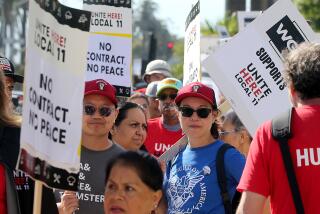Attorney General’s Opinion Places Lawndale’s General Plan in Doubt
- Share via
Lawndale will soon have to contend with the “very significant legal implications” of a recent state attorney general’s opinion that raises questions about the adoption of the city’s General Plan, City Atty. David J. Aleshire told officials last week.
Aleshire is expected to deliver a formal analysis of the opinion, and the city’s possible responses, at the Feb. 22 meeting of the Planning Commission. The matter will then be submitted to the City Council.
The fate of the General Plan, which outlines development goals for the city, may ultimately be decided by the voters of Lawndale.
The new opinion, which jolted city officials when it became public a few weeks ago, reverses a 1974 attorney general’s opinion that had guided city officials for 15 years.
In 1974, the attorney general’s office said that Ordinance 82, a Lawndale initiative law that required a citywide vote on the General Plan, was unconstitutional. Relying on that opinion, the council did not put the plan on the ballot and adopted it by a 4-1 vote in 1976.
But in a letter dated Dec. 20, 1988, Deputy Atty. Gen. Rodney O. Lilyquist labeled the 1974 opinion erroneous.
That was a victory for local activists Steve Mino and Herman Weinstein, who participated in the successful petition drive for Ordinance 82. They have, over the last year, argued that the city was wrong to ignore Ordinance 82 on the basis of the 1974 opinion. They argued that a legal opinion, even from the state attorney general, cannot override an initiative ordinance.
At the urging of Mino and Weinstein, the council asked the state attorney general to re-examine the 1974 opinion.
At Thursday’s council meeting, Mino called the current General Plan an illegal document and asked the council to rescind it. He contends that the plan and all its amendments must be submitted to the city’s voters.
Aleshire advised the council to proceed cautiously because of litigation that could result if the General Plan was declared invalid. He said this, in effect, would create a moratorium on all development in Lawndale until a new plan could be prepared and put on the ballot.
If the council rescinds the plan, Aleshire said, the city would probably face lawsuits from developers who could argue that their property rights had been violated.
Rescinding the plan would have “a very dramatic effect,” he said.
More to Read
Sign up for Essential California
The most important California stories and recommendations in your inbox every morning.
You may occasionally receive promotional content from the Los Angeles Times.













